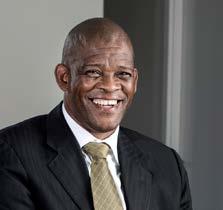
5 minute read
A LOCAL PERSPECTIVE
We need to work together if we want to revive South Africa’s tourism industry.
In early 2020, South Africa shut down. Businesses closed their doors, airplanes were grounded, and people became all too familiar with the inside of their homes. The country’s economy took a huge hit because of necessary lockdown measures, but the tourism sector has borne the brunt of the pandemic’s negative impact, losing billions of rands in revenue and over 300 000 jobs since the outbreak began.
Advertisement
By Jerry Mabena, chief executive officer of Motsamayi Tourism Group.
While other sectors of the economy have shifted to adapt to our current economic environment by implementing remote work and accelerating digital transformation, the nature of the tourism industry has made it difficult to respond to the challenges brought on by Covid-19 travel restrictions. Simply put, no travellers mean no tourism. According to a 2020 report1 released by Statistics South Africa, foreign arrivals dropped by 71 per cent from just over 15.8 million in 2019 to less than five million in 2020.
Saving the tourism sector and the livelihoods that depend on it will require both the public and private sector to collaborate and inject more resources into the sector to ensure that the worst possible scenario may be avoided.
Collaborative reinvestment will reinvigorate the industry
South Africa needs to prioritise robust private-public partnerships to reignite the country’s tourism sector and ensure that the industry may meaningfully contribute to the national economy. The tourism sector requires comprehensive investment to grow to its full potential and this will only be achieved by both the public and private sector working together to achieve the same goals.
The industry needs investment that will balance both short-term and longterm recovery, help spark innovation, and enhance sustainability. The government has begun to take steps to invest in reviving the local tourism sector, such as the recent launch of the Tourism Equity Fund where Tourism Minister Mmamoloko Kubayi-Ngubane announced that the government would be committing R1.2 billion towards the renewal of the South African tourism sector over the next three years. But, given the country’s slow vaccination programme and the reality that the virus and its impact might be with us for many more years, more needs to be done.
Rebuilding tourism must become a priority and ordinary South Africans have a part to play. By travelling within the country and spending money at local travel and hospitality establishments, local South Africans may help to save the industry too. Domestic tourism will be the key in the ignition restarting the sector, helping to mitigate the impact on jobs and businesses in key destinations in the country and ensuring that the industry becomes more resilient in the future.
Investing in the country’s tourism sector now could redefine the industry for years to come. The world is starting to open up as more and more regions carry out their vaccination rollout. Today, half of all adults in the US2 have already been vaccinated and people are itching to travel. Not only that, but they’re also looking for more cost-effective places to travel to.
While South Africa remains on the UK’s red list – a key market for the local tourism industry – the good news is that cautious travel between the two countries is planned to resume in the coming weeks, with British Airways announcing that it would resume international travel this month.
Reopening international travel and accelerating South Africa’s vaccine rollout could help the country position itself to welcome the huge spike in international travel which we are likely to see as more people receive their vaccinations, generating greater revenue for the economy.

Tourism is more than just an extra
The travel, tourism and hospitality industry might often be seen as a sector that is not as important in South Africa as, let’s say, manufacturing or agriculture, but it is one of the largest employers in the country and one of the biggest contributors to the country’s GDP.
In 2018, the direct contribution of the tourism sector to GDP was R130.1 billion, constituting nearly three per cent direct contribution to GDP, and around four and a half per cent of total employment in South Africa, employing more than 740 000 South Africans in that year.
Additionally, the tourism sector’s value chain touches on almost every other sector of the country’s economy. The sector has a mutually beneficial relationship with just about every sphere of economic activity in the country, from agriculture through catering, to logistics through car rentals to arts and craft and entertainment – even sports is part of the value chain. It is certainly one of the most important industries and therefore requires special attention if the country is to effectively rejuvenate and grow the economy, save jobs and create more opportunities to get our people working.
While South Africa’s economy is seeing upward momentum, it’s not enough to offset the losses sustained over the past year. In its 2021 World Economic Outlook, the International Monetary Fund has forecast South Africa’s annual growth rate at 3.1 per cent for 2021, but the country’s economy had contracted by seven per cent during 2020, and so the country will find itself significantly behind our preCovid growth. The tourism industry has the greatest potential to stimulate growth and reduce the current unemployment rate (at 32.6 per cent, a 13-year high); therefore, breathing life back into South Africa’s tourism industry could boost national economic growth and see the country recover faster from the longlasting impact of the pandemic.
The tourism industry is on the backfoot. It is standing on the edge of the cliff and, more than merely saving it, we need to revitalise it and use it to save the jobs and livelihoods directly and indirectly linked to it and help facilitate a rebound in a sector that is vital to the country’s economy.
1. www.statssa.gov.za/?p=14281 2. https://www.imf.org/en/Publications/WEO/Issues/2021/03/23/ world-economic-outlook-april-2021
Who is Jerry Mabena?

Jerry Mabena holds a B Com degree in Industrial Psychology and Economics from Rhodes University. He is the chief executive officer of Thebe Services Division, where he is responsible for the integration and growth of the Thebe Investment Corporation’s investment in the tourism, financial services and energy services industries.
Before joining Thebe in 2011, he served as chief executive officer of Kagiso Property Holding. He has experience in advertising, marketing and business management.
He serves as a director of Motsamayi Tourism Group (previously called Thebe Tourism Group (Pty) Limited). He also holds a diploma in project management from Damelin and a certificate programme in accounting and finance from Wits Business School.










